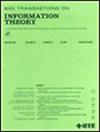与并行设备无关的量子密钥分发
IF 2.2
3区 计算机科学
Q3 COMPUTER SCIENCE, INFORMATION SYSTEMS
引用次数: 23
摘要
量子密码学的一个突出应用是分发可证明安全的密钥。Vazirani和Vidick(Physical Review Letters,1131405012014)将这种安全证明扩展到了设备无关(DI)场景,在该场景中,用户不需要信任底层量子设备的完整性。他们和随后的作者分析的协议都需要N个多人游戏的顺序执行,其中N是安全参数。在这项工作中,我们证明了所有游戏并行执行的协议的安全性。除了减少密钥生成所需的时间步长外,这一结果还通过允许每个用户在其实验室内输入的任意信息泄漏来降低DI-QKD的安全要求。据我们所知,这是完全独立于设备的QKD协议的第一个并行安全证明。我们的协议容忍了恒定水平的设备不精确性,并实现了线性密钥速率。本文章由计算机程序翻译,如有差异,请以英文原文为准。
Parallel Device-Independent Quantum Key Distribution
A prominent application of quantum cryptography is the distribution of cryptographic keys that are provably secure. Such security proofs were extended by Vazirani and Vidick (Physical Review Letters, 113, 140501, 2014) to the deviceindependent (DI) scenario, where the users do not need to trust the integrity of the underlying quantum devices. The protocols analyzed by them and by subsequent authors all require a sequential execution of N multiplayer games, where N is the security parameter. In this work, we prove the security of a protocol where all games are executed in parallel. Besides decreasing the number of time-steps necessary for key generation, this result reduces the security requirements for DI-QKD by allowing arbitrary information leakage of each user's inputs within his or her lab. To the best of our knowledge, this is the first parallel security proof for a fully device-independent QKD protocol. Our protocol tolerates a constant level of device imprecision and achieves a linear key rate.
求助全文
通过发布文献求助,成功后即可免费获取论文全文。
去求助
来源期刊

IEEE Transactions on Information Theory
工程技术-工程:电子与电气
CiteScore
5.70
自引率
20.00%
发文量
514
审稿时长
12 months
期刊介绍:
The IEEE Transactions on Information Theory is a journal that publishes theoretical and experimental papers concerned with the transmission, processing, and utilization of information. The boundaries of acceptable subject matter are intentionally not sharply delimited. Rather, it is hoped that as the focus of research activity changes, a flexible policy will permit this Transactions to follow suit. Current appropriate topics are best reflected by recent Tables of Contents; they are summarized in the titles of editorial areas that appear on the inside front cover.
 求助内容:
求助内容: 应助结果提醒方式:
应助结果提醒方式:


